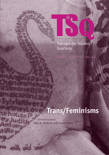
TSQ-Transgender Studies Quarterly
Scope & Guideline
Engaging with the Evolving Landscape of Transgender Studies
Introduction
Aims and Scopes
- Intersectionality in Trans Studies:
The journal explores how various axes of identity, including race, sexuality, and class, intersect with gender identity, providing a nuanced understanding of the transgender experience. - Political Economy and Trans Activism:
Papers often examine the relationship between transgender identities and broader socio-economic structures, including capitalism, colonialism, and anti-Blackness, highlighting the political dimensions of trans activism. - Cultural Representations and Critiques:
TSQ publishes critical analyses of cultural texts, including literature, film, and performance, that engage with transgender identities, thereby contributing to the discourse on representation and visibility. - Historical Contextualization:
The journal emphasizes historical perspectives on transgender identities and movements, providing a historical lens through which contemporary issues can be understood. - Trans Health and Care:
A significant focus is placed on the health and well-being of transgender individuals, including discussions on medical practices, healthcare policies, and community-based care models. - Creative and Artistic Expressions:
TSQ encourages submissions that incorporate creative forms of expression—such as photography, art, and performance—into transgender studies, fostering a dialogue between academia and the arts.
Trending and Emerging
- Trans* Marxism and Political Economy:
An increasing number of papers are engaging with Marxist frameworks to analyze the political economy of transgender identity and activism, highlighting connections between capitalism and trans oppression. - Decolonial and Indigenous Perspectives:
Recent issues showcase a growing emphasis on decolonial thought and Indigenous perspectives within trans studies, challenging colonial narratives and advocating for the recognition of Indigenous gender identities. - Trans and Queer Migration:
There is a notable rise in scholarship addressing the experiences of transgender and queer migrants, particularly in contexts of illegalization, detention, and the impact of global migration policies on trans lives. - Environmental and Ecological Intersections:
Emerging discussions link transgender studies with environmental issues, exploring how ecological crises intersect with gender identities and the experiences of trans individuals. - Affective Politics and Care:
Recent publications are increasingly focusing on the politics of care within transgender communities, examining how affective relationships shape activism and community building. - Technoculture and Digital Identity:
The interplay between technology, social media, and transgender identity is gaining traction, with papers analyzing how digital spaces influence self-representation and community formation.
Declining or Waning
- Traditional Gender Binaries:
There is a noticeable decline in papers that strictly adhere to traditional binary frameworks of gender. Instead, contemporary submissions are increasingly embracing non-binary, fluid, and expansive understandings of gender. - Cisnormative Feminism:
The discourse surrounding cisnormative feminism appears to be waning, as the journal shifts focus toward more inclusive feminist perspectives that critically engage with transgender issues and trans feminism. - Mainstream Trans Narratives:
The prevalence of mainstream narratives surrounding transgender identities, often centered on transition and identity affirmation, has decreased. TSQ is moving towards more radical, intersectional narratives that challenge these dominant frameworks. - Medicalization of Trans Identities:
There is a noticeable reduction in the emphasis on medicalized approaches to transgender identities, reflecting a broader critique of pathologization and the push for self-determination over medical intervention. - Individualism in Trans Activism:
The journal has seen a decline in submissions focusing on individualistic accounts of trans experiences, favoring instead collective, community-based narratives that emphasize solidarity and intersectional activism.
Similar Journals
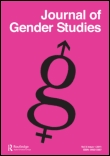
JOURNAL OF GENDER STUDIES
Shaping the future of gender discourse through innovative research.JOURNAL OF GENDER STUDIES is a leading academic journal published by Routledge Journals, Taylor & Francis Ltd, specializing in the interdisciplinary field of gender studies. Since its inception in 1991, the journal has become a pivotal platform for scholarly discourse, providing cutting-edge research that challenges and redefines gender norms and identity across various cultural contexts. With an impressive ranking in the Q1 quartile for both Gender Studies and Arts and Humanities, this journal holds a strong position in the academic community, reflecting its significant impact with a percentile rank of 86th across several categories in the Scopus database. Researchers, professionals, and students alike will find invaluable insights and innovative perspectives in its pages, furthering their understanding of gender issues and contributing to societal change. Keep abreast with the latest developments in this vibrant field through the JOURNAL OF GENDER STUDIES, a crucial resource for anyone dedicated to exploring the complexities of gender in contemporary society.
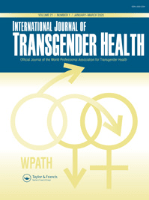
International Journal of Transgender Health
Fostering understanding through open access scholarship.International Journal of Transgender Health, published by TAYLOR & FRANCIS INC, is a premier academic journal dedicated to advancing knowledge in the interdisciplinary fields of transgender health, gender studies, and health policy. With an impressive impact factor reflected in its 2023 Q1 rankings across various categories including Gender Studies and Health Policy, this journal serves as a vital resource for researchers, practitioners, and policymakers alike. The journal is readily accessible through its open access model, ensuring that the latest research findings and debates in transgender health are disseminated widely to foster understanding and improve health outcomes for transgender individuals. The ISSN 2689-5269 and E-ISSN 2689-5277 allow for seamless reference in academic and professional work. As the field continues to evolve, International Journal of Transgender Health remains committed to providing a platform for rigorous research, innovative practices, and comprehensive reviews that address the pressing issues facing the transgender community. Its prestigious standing in the academic community underscores its important role in shaping future discussions and policies within this crucial area of health and social science.
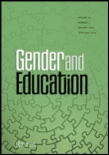
GENDER AND EDUCATION
Challenging Norms, Shaping Futures in EducationGENDER AND EDUCATION, published by ROUTLEDGE JOURNALS under TAYLOR & FRANCIS LTD, stands as a premier academic journal at the intersection of gender studies and educational theory. Since its inception in 1989, this esteemed journal has garnered a reputation for advancing scholarly discourse and addressing critical issues surrounding gender dynamics in educational settings. With an impressive impact factor and recognized as Q1 in both the Education and Gender Studies categories for 2023, GENDER AND EDUCATION consistently ranks among the top publications in its field, notably positioned at #16 out of 213 in Gender Studies and #261 out of 1543 in Education according to Scopus. The journal features a diverse range of research articles, theoretical papers, and case studies aimed at fostering a deeper understanding of how gender influences educational practices and outcomes. This concise yet impactful journal serves as essential reading for researchers, professionals, and students dedicated to exploring the complex intersections of gender and education in today's society. For scholars seeking to contribute to this vital field, GENDER AND EDUCATION is an invaluable resource and platform for dissemination of groundbreaking research.
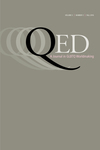
QED-A Journal in GLBTQ Worldmaking
Illuminating pathways in GLBTQ worldmaking.QED: A Journal in GLBTQ Worldmaking, published by Michigan State University Press, is a pioneering platform dedicated to the exploration and critique of GLBTQ topics within cultural and gender studies. Since its inception in 2019, this journal has aimed to foster a multi-dimensional understanding of worldmaking processes in GLBTQ contexts, contributing to critical dialogues and interdisciplinary scholarship. With an impact factor that places it in the Q2 quartile for Cultural Studies and Q3 for Gender Studies, it is recognized for its significant contributions to these fields, ensuring its relevance among scholars and practitioners. The journal operates under a selective peer-review process, providing quality open access, allowing researchers and academics around the globe to engage with and disseminate vital findings while tackling pressing issues within GLBTQ studies, fostering both academic inquiry and social change.
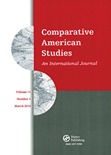
COMPARATIVE AMERICAN STUDIES
Fostering Dialogue Across Diverse American ExperiencesCOMPARATIVE AMERICAN STUDIES, published by Routledge Journals, Taylor & Francis Ltd, is a vital academic platform dedicated to exploring the multifaceted narratives and cultural dynamics within the American context from a comparative perspective. With its ISSN 1477-5700 and E-ISSN 1741-2676, this journal provides a comprehensive forum for original research, critical reviews, and diverse scholarly articles that contribute to the understanding of American studies in relation to global influences. Established in 2008 and converging into 2024, the journal operates within the Q3 quartile in both Arts and Humanities and Cultural Studies, highlighting its reputable position within the academic community. Though currently not listed as open access, it maintains a solid standing in the Scopus rankings, making it a significant resource for researchers and students interested in cultural studies, sociology, and political science. The journal's commitment to fostering interdisciplinary dialogue ensures that it remains a cornerstone for those seeking to engage with contemporary issues affecting American identities and social constructs.

Settler Colonial Studies
Transforming Scholarship into Social JusticeSettler Colonial Studies, published by Taylor & Francis Australia, stands as a pivotal journal within the interdisciplinary fields of anthropology, cultural studies, history, law, and sociology. With an ISSN of 2201-473X and an E-ISSN of 1838-0743, this journal has established a significant presence since its inception in 2011, continuing to contribute to thought-provoking discussions through 2024 and beyond. As an open-access platform, it provides an invaluable resource for researchers and practitioners in understanding the complexities of settler colonialism and its enduring effects across societies. The journal boasts impressive Scopus rankings—placing in the top quartiles across multiple categories, including Q1 in both Cultural Studies and History—confirming its status in the academic community. By merging rigorous scholarship with critical inquiry, Settler Colonial Studies invites contributions that explore, challenge, and illuminate the intricate realities of colonial histories, shaping valuable dialogues for a diverse readership committed to social justice and historical comprehension.
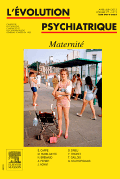
EVOLUTION PSYCHIATRIQUE
Exploring Innovations in Psychiatry and Mental WellnessWelcome to EVOLUTION PSYCHIATRIQUE, a prominent journal in the field of Psychiatry and Mental Health published by ELSEVIER FRANCE-EDITIONS SCIENTIFIQUES MEDICALES ELSEVIER. With a rich publication history dating back to 1948, this journal serves as a critical platform for the dissemination of cutting-edge research and insights within the realm of mental health. As of 2023, it has attained a commendable position in the Q2 quartile for Arts and Humanities and Q4 for Psychiatry and Mental Health, reflecting its diverse contributions to the scholarly community. The journal’s unique scope encompasses both theoretical and empirical studies that inform and invigorate the dialogue surrounding psychiatric evolution. Despite its current non-open access status, EVOLUTION PSYCHIATRIQUE remains a pivotal resource for researchers, clinicians, and students alike, offering valuable perspectives that illuminate the complexities of mental health across different genres of study and practice. Through rigorous peer review and a commitment to scientific integrity, this journal continues to foster advancements and discussions that are essential for the progress of psychiatry in contemporary society.
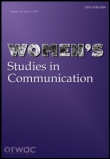
Womens Studies in Communication
Empowering Research on Women's Roles in CommunicationWomens Studies in Communication, published by Routledge Journals, Taylor & Francis Ltd, stands as a pivotal platform for scholars and practitioners in the fields of communication and gender studies. With an impressive history of publishing since 1977, this journal delves into the intricate intersections of gender and communication, fostering critical dialogue and innovative research. It currently holds a category quartile ranking of Q2 in both Communication and Gender Studies, reflecting its significant impact in these vital fields. With an ongoing commitment to exploring the nuances of women's voices and experiences in various communicative contexts, the journal provides an invaluable resource for understanding contemporary societal issues. While currently not available as an open-access publication, its adherence to high academic standards, evidenced by its Scopus rankings, making it an essential read for researchers, students, and professionals eager to enrich their understanding of gender dynamics in communication.
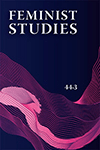
FEMINIST STUDIES
Advancing feminist scholarship and critical discourse.Feminist Studies, published by Feminist Studies Inc., is a pivotal journal in the field of Gender Studies and Arts and Humanities. With a rich history dating back to 1975, this journal has consistently provided a platform for scholarly engagement and critical discourse surrounding feminist theories and practices. Feminist Studies holds an impressive ranking in the Q2 category for both Arts and Humanities (miscellaneous) and Gender Studies, indicating its significant impact and relevance in these fields. The journal is indexed within the Scopus database, holding a ranking of #178 out of 552 in Arts and Humanities and #84 out of 213 in Social Sciences, reflecting its critical role in advancing feminist scholarship. Although not an open access journal, it aims to enrich academic dialogue and foster inclusive understanding through intellectually stimulating articles. Researchers, professionals, and students alike are encouraged to contribute to and engage with the robust content that Feminist Studies offers, making it an essential resource for anyone dedicated to the exploration of feminist issues and gender equity.

Gender Place and Culture
Fostering Inclusive Discourse on Gender and CultureGender, Place and Culture is a leading international journal published by Routledge Journals, Taylor & Francis Ltd, dedicated to advancing knowledge and understanding in the fields of Gender Studies, Cultural Studies, and related disciplines. Since its inception in 1994, this esteemed publication has become a critical resource for researchers, professionals, and students seeking to explore the intricate relationships between gender, identity, and spatial dynamics. With a commendable impact factor and prestigious rankings placing it in the Q1 quartile for Arts and Humanities (miscellaneous), Cultural Studies, and Gender Studies, the journal not only underscores its significance within academia but also reflects its commitment to high-quality scholarship. The editorial team actively promotes rigorous research that addresses contemporary societal issues, fostering an inclusive scholarly discourse. Researchers interested in contributing to this dynamic field will find Gender, Place and Culture an invaluable platform for sharing innovative ideas and findings, contributing to the ongoing conversation around the complex interplay of gender and space.